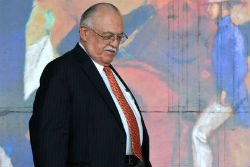Honduras’ Foreign Ministry confirmed that the United States government has requested the extradition of Jaime Rosenthal, marking the next step in the US money laundering investigation of one of the country’s wealthiest and most politically influential families.
Foreign Minister Arturo Corrales told La Prensa that his office received the extradition request on December 24. Corrales said he will present the petition before the Supreme Court on January 4.
Rosenthal, a former vice president of Honduras and high ranking official in the Liberal Party, who also oversees the economic conglomerate Grupo Continental, was indicted by the US along with his son Yani, his nephew, Yankel, and a family lawyer last October for money laundering for drug trafficking and corrupt interests.
US authorities arrested Yankel October 6, a day before the indictment was unsealed. Yani reportedly turned himself in a month later.
Rosenthal’s defense lawyer, Marlon Duarte, responded to the recent announcement by saying that Jaime Rosenthal must face criminal charges against him in Honduras before he can be extradited, reported EFE. A Honduran court ordered Rosenthal to be put under house arrest in late November for suspected tax fraud.
InSight Crime Analysis
The extradition request is a clear signal from the United States that it plans on proceeding with the politically sensitive and economically damaging case. The indictment, and a US Treasury “kingpin” designation of the Rosenthal conglomerate that accompanied it, effectively shuttered the family bank and put at risk as many as 11,000 jobs connected to the Rosenthal-owned companies.
When his son Yani — a political heavyweight in his own right — reportedly turned himself over to US authorities, it was seen as a possible attempt to provide legal protection for Jaime. If this was Yani’s intent, it appears his actions weren’t enough to shield his father.
SEE ALSO: Coverage of Elites and Organized Crime
However, it is unclear how soon Honduran authorities will turn over the elder Rosenthal, if at all. As Rosenthal’s defense lawyer correctly pointed out, the business magnate must first resolve any pending charges against him in Honduras before he can be cleared for extradition.
Further complicating the issue is the uncertain outlook of Honduras’ Supreme Court, which is in charge of authorizing extradition requests. Officials are currently in the process of naming new judges to the high court, and the makeup of the bench could have an impact on Rosenthal’s fate.

